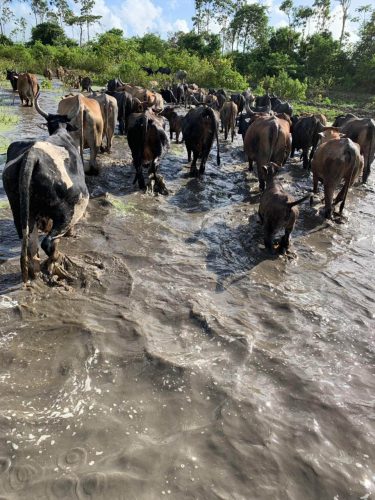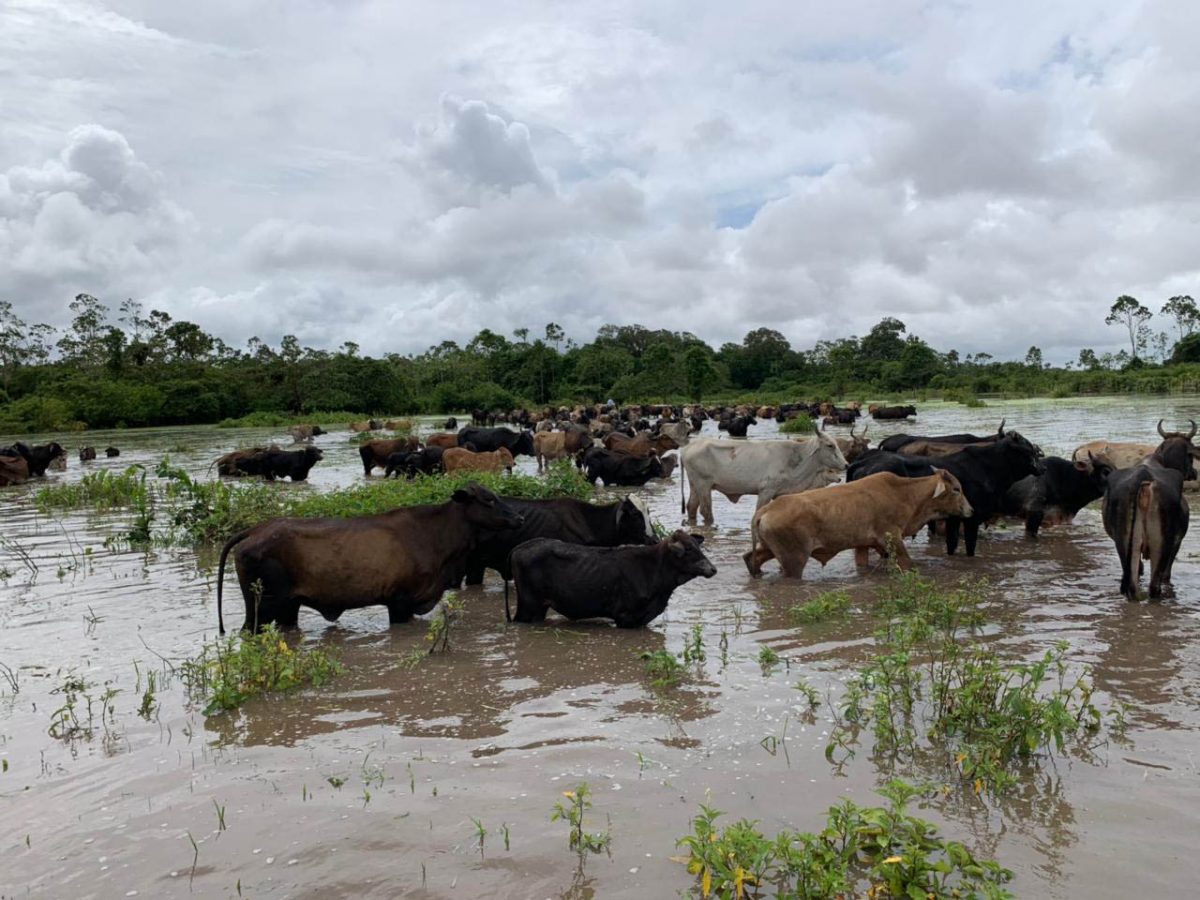With animals battling to survive in the heavily submerged Kokerite Savan-nah, one cattle farmer in Black Bush Polder recently said that he witnessed a man dealing chops to his five cows and one bull on a dam in the front areas – the result of ongoing conflict with rice growers.
Alister Rajkumar of Yakusari, Black Bush Polder, Corentyne told Stabroek News that while hundreds of their cattle remain in the flooded Kokerite Savannah they had kept a few on the water coast dam which is located in the front areas between the Kokerite Savannah and rice cultivations, from which they were sourcing milk.
He said last Monday around 7.30 am while he was grazing those animals he noticed a man passing on a bicycle. Initially, Rajkumar thought that the man was heading in to check on his rice. He said, he then noticed the man firing his hand but he did not take it for anything as he thought the man was chasing the animals from his path.

However, after his animals started to run into a savannah Rajkumar decided to check on them and he discovered that five cows and one bull had sustained chop injuries.
He phoned his father, Jacob Rajkumar, 64, who told him to bring out the animals immediately after which they filed a police report at the Mibicuri Police Station.
Stabroek News was told that an investigation has been launched which the Whim Police Station is assisting with. Sources have since relayed that the accused has denied the allegation.
Rajkumar relayed that his animals have since received medical attention from a vet and are in the frontlands recovering. He noted that one of the cows which sustained a chop on the belly has a calf and seems to be the most affected.
The man stressed that if the animals are on the dams which fall under the National Drainage and Irrigation Authority and are not harming or destroying anything then he doesn’t see how persons can attack them.
He detailed a story where recently a cow was lying on a dam which a tractor operator was using to head out of the area, “and he run over the cow foot with he tractor.”
Rajkumar said, “That’s the things we are facing in here plus the flooding, it’s overbearing now.”
Rajkumar who had just returned from the Kokerite Savannah told this newspaper that the water in the savannahs was still high. He said the level had dropped but last Monday they noticed the water rising to a higher level.
He said it is a sad situation in the backdam as they head in every day to check on their animals.
He relayed that one day his father went to the location and discovered that one cow and a calf had died, “but most calves dying. Them big cows trying to survive but them calves na able”, he noted.
The man pointed out that only recently they had to spend $200,000 on workmen’s fees in order to build a fence in the area, “and we na count materials and diesel and everything, that’s just to pay workmen.”
According to him, there is another location that has to be fenced and they have since contacted the Guyana Livestock Development Authority (GLDA), which has indicated that they would be assisting with some materials.
Rajkumar further relayed that it has been a difficult task for him and his father to get a handle on the situation explaining that they switch shifts to graze the animals in the frontlands and check on those in the Kokerite Savannah.
He stressed that this flooding has placed many cattle farmers including his family in a situation they have never imagined possible. He called on the government to stick to their promise to offer support to build back their livelihoods once the water recedes.
On Thursday, Agriculture Minister Zulfikar Mustapha had condemned attacks on cattle in the Black Bush area.
In a statement, he had said: “Over the past few days, cattle farmers from Berbice have been reaching out to me about the issue. I’ve instructed the regional agriculture officers to meet with the farmers. Farmers have also engaged regional law enforcement. I’m hoping that things do not escalate further. I know these are very troubling times for farmers who are trying to preserve whatever cultivation and livestock they have left. I’m urging farmers to work together and be their brother’s keeper because this flooding is a national issue that has affected us all. This is time for us to demonstrate compassion for life and our fellow farmers”.
The minister had also said that the GLDA and the Regional Agricultural Coordinator for Region Six, Dennis Deroop are working with farmers to determine the reason behind the “heinous attacks” and to amicably resolve any conflict that currently exists.
He added that the GLDA and regional agricultural officers are working with farmers to ensure animals brought from the backlands remain housed in secure areas and away from farms and rice fields. He stated that the GLDA has been providing feed free of cost to farmers.
So far, over 20,000 animals have been relocated to higher grounds in the frontlands, the ministry had said in its release reporting the minister’s statement.






